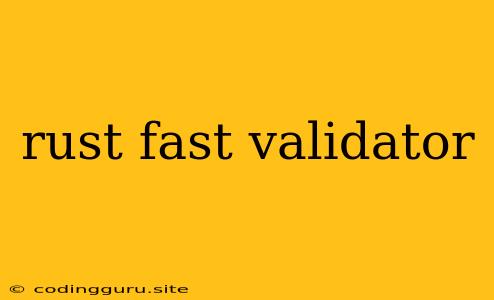Why Rust is the Perfect Choice for Building Fast Validators
In the world of blockchain technology, validators play a crucial role in ensuring the security and integrity of the network. They are responsible for verifying and adding new blocks to the blockchain, a process that requires significant computational power and speed. As blockchains become increasingly complex and demanding, the need for fast and efficient validators becomes paramount.
This is where Rust shines. Rust, a modern systems programming language, offers a unique combination of speed, safety, and control, making it an ideal choice for developing high-performance validators.
Why is Rust So Fast?
Rust's performance is primarily attributed to its focus on memory safety and zero-cost abstractions. Unlike languages like C++ where manual memory management can lead to vulnerabilities and performance bottlenecks, Rust's ownership system ensures that memory is handled safely and efficiently without the need for garbage collection. This results in predictable execution times and minimal overhead.
How Does Rust Ensure Safety and Speed?
- Ownership System: Rust's ownership system guarantees that each piece of data has a single owner at any given time, preventing data races and memory leaks. This ensures both safety and efficiency.
- Borrowing: Rust allows temporary borrowing of data, enabling efficient sharing of data without compromising ownership. This approach ensures that data is accessed safely and efficiently.
- Zero-Cost Abstractions: Rust's abstractions come at no runtime cost. This means that features like generics, traits, and closures are translated directly to efficient machine code, maximizing performance.
Rust for Validator Development: A Deeper Dive
Let's delve into the specific advantages of using Rust for building validators:
- High Throughput: Rust's speed and efficiency allow for handling a high volume of transactions and block verifications, making it perfect for fast-paced blockchains.
- Low Latency: Rust's deterministic nature and minimal overhead contribute to low latency in block processing, ensuring quick response times and a smooth user experience.
- Security: Rust's strong emphasis on memory safety and data integrity eliminates vulnerabilities commonly found in other languages, making it a secure choice for critical applications like blockchain validators.
- Concurrency: Rust provides excellent support for concurrency through features like threads and asynchronous programming. This allows validators to handle multiple tasks simultaneously, increasing overall efficiency.
Building a Rust Validator: A Practical Example
To demonstrate the practicality of Rust for validator development, let's consider a simplified example of a Rust validator. Here's a snippet of code that showcases Rust's concise and expressive syntax:
use serde::{Deserialize, Serialize};
use tokio::sync::mpsc;
use std::sync::Arc;
#[derive(Serialize, Deserialize)]
struct Transaction {
sender: String,
receiver: String,
amount: u64,
}
#[tokio::main]
async fn main() {
let (tx, mut rx) = mpsc::channel::();
let validator = Arc::new(Validator { tx });
// Start the validator in a separate thread
tokio::spawn(async move {
validator.run().await;
});
// Receive transactions and process them
while let Some(tx) = rx.recv().await {
validator.process_transaction(tx).await;
}
}
struct Validator {
tx: mpsc::Sender,
}
impl Validator {
async fn run(&self) {
// Logic for validating transactions
// ...
}
async fn process_transaction(&self, tx: Transaction) {
// Logic for processing validated transactions
// ...
}
}
This example demonstrates how Rust can be used to create a validator that efficiently handles incoming transactions. The code utilizes Rust's concurrency features to manage multiple tasks, ensuring a responsive and efficient system.
Conclusion
Rust's speed, safety, and control make it a powerful tool for building fast and reliable validators. Its features like memory safety, zero-cost abstractions, and concurrency support enable developers to create highly performant validators capable of handling the demands of modern blockchains. As blockchain technology continues to evolve, Rust is well-positioned to become the go-to language for validator development, ensuring a secure and efficient future for decentralized networks.
